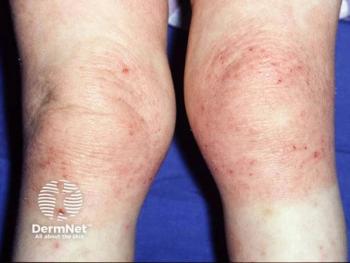
Atopic Dermatitis and Mental Health of Pediatric Patients
A recent study in JAMA Dermatology investigated the possible association of atopic dermatitis and mental health outcomes across childhood.
A longitudinal, population-based birth study in
The study included pediatric patients followed from birth for a mean (SD) duration of 10.0 (2.9) years from the UK Avon Longitudinal Study of Parents and Children. The data was collected from September 6, 1990, to December 31, 2009, and analyzed from August 30, 2019, to July 30, 2020. The annual period prevalence of AD was assessed at 11 points from 6 months to 18 years, and measured by standardized questions about flexural dermatitis, according to the article.
The symptoms of depression were measured using child-reported responses to the Short Moods and Feelings Questionnaire at 5 points from 10 to 18 years while the internalizing behaviors were measured by maternal report of the Emotional Symptoms subscale of the Strength and Difficulties Questionnaire at 7 points from 4 to 16 years.
There were 11,181 pediatric patients included in the analysis with 51.2% of them being male. The period prevalence of symptoms of depression ranged from 6.0% to 21.6%; for internalizing behaviors, from 10.4% to 16.0%, according to the study.
Mild to moderate AD was not associated with symptoms of depression, but it was associated with internalizing behaviors as early as 4 years of age—mean increased odds of 29%-84% across childhood in adjusted models. Also, severe AD was associated with symptoms of depression (adjusted odds ratio, 2.38; 95% CI, 1.21-4.72) and internalizing symptoms (adjusted odds ratio, 1.90; 95% CI, 1.14-3.16).
“The sleep quality mediated some of this association, but it was not explained by differences in sleep duration, asthma/rhinitis, or levels of inflammatory markers (interleukin 6 and C-reactive protein),” the authors wrote.
The study found that AD was associated with symptoms of depression and internalizing behaviors throughout childhood and adolescence and the risk of internalizing symptoms was increased with mild AD beginning early in childhood. This highlighted the importance of behavioral and mental health awareness in this population, the authors concluded.
Reference:
1. Kern C, Wan J, LeWinn KZ, et al. Association of atopic dermatitis and mental health outcomes across childhood: a longitudinal cohort study. JAMA Dermatology. Published online September 1, 2021. doi:10.1001/jamadermatol.2021.2657
Newsletter
Like what you’re reading? Subscribe to Dermatology Times for weekly updates on therapies, innovations, and real-world practice tips.











